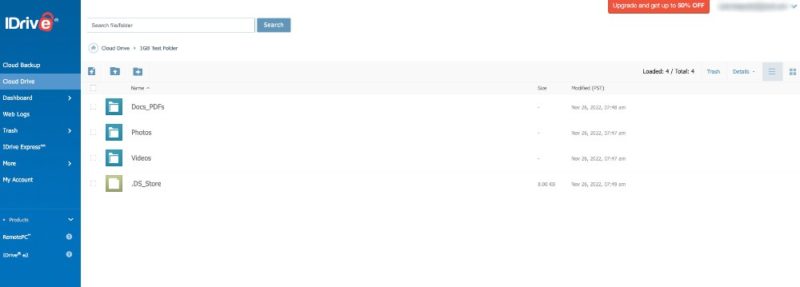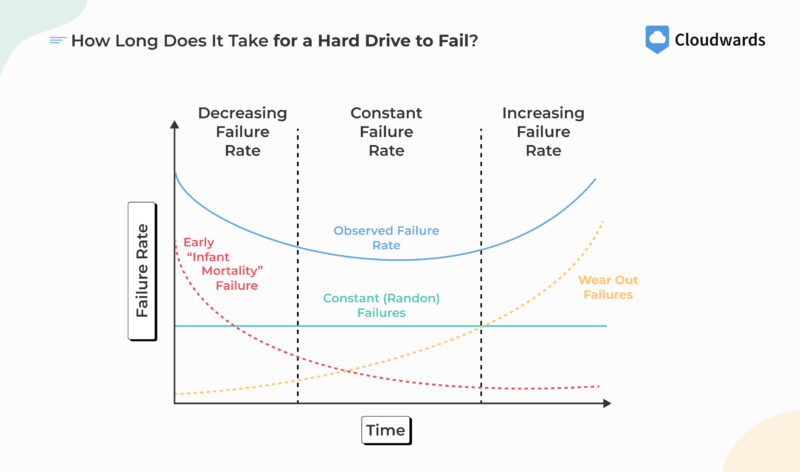How Long Does a Hard Drive Last? Lifespan of an HDD vs SSD Explained in 2025
At some point in a hard drive's lifespan, it will fail. If you haven’t protected your data, you could lose it all. How long does a hard drive last, though? Read on to see what studies indicate and learn how to protect your data.
Anyone who owns a computer or stores data on an external hard drive has almost certainly experienced a failure. It provokes a terrible sinking feeling when you just want to get on with your day. This feeling is compounded if you haven’t backed up your data. If you’ve used a hard drive to store your files, you might be wondering, “How long does a hard drive last?”
To answer that question in the quickest way possible, the average is between three and five years. However, as you will see in this article, there are exceptions to that average. A hard drive is like any other piece of physical tech — at some point, it will stop working. However, planning and knowing the signs can help you avoid a digital disaster.
You can avoid total data loss when a hard disk fails by backing up your data. You can do this with one of the best online backup services.
-
01/28/2025 Facts checked
This article has been rewritten to include data from studies and to highlight how you can protect your data.
How Long Does an External Hard Drive Last?
External hard drives will (on average) last you anywhere from three to five years, which is the same for other types of disk drives. An external hard drive is good for backing up data. If you want to compare alternatives, we suggest you check out our guide on using cloud storage vs an external hard drive.

features, affordable pricing and strong security.
A Research Study: How Long Does It Take for a Hard Drive to Fail?
When compiling data and research for this article, we used studies conducted by Backblaze 1 and Ars Technica. 2 Both concluded that the average is around three to five years, which is not a long time, even for tech. However, many variables can cause a hard drive to exceed or fall short of that average.
Some hard drives are better than others, so your choice matters. Additionally, it’s not just a matter of which brand you use. The studies showed that specific models from a single manufacturer also make a difference in longevity.
Another factor is how you use the hard drive and how often. For example, a hard drive will last longer and perform better for a casual user compared to someone who frequently reads and writes a lot of data. Similarly, an external hard drive used purely for long-term archiving that’s rarely accessed will likely have a much longer lifespan than a hard drive in frequent use.
Several other factors can directly impact the life expectancy of a hard drive, including cleanliness and environmental conditions. Dust is the enemy of electronics, and it can be hard to ensure it doesn’t accumulate on and around your hard drive. The heat generated by your computer or the environment around the hard drive is another factor to consider.

Lifespan of HDDs vs SSDs
As stated, the average lifespan of a hard drive is between three and five years. The most common factor that affects a hard drive’s longevity is how it is used and cared for. HDDs have moving parts and magnetic disks, which also makes them more prone to failure.
Solid-state drives (SSDs) use flash memory and do not have moving parts inside, which helps make them less prone to failure. SSDs are more reliable than HDDs, but they typically do not last as long as HDDs. SSDs can suffer from the same factors that shorten an HDD’s lifespan, such as how they are used and cared for.
Signs of Hard Drive Failure
A hard drive will display drastically different symptoms during failure than when it is running normally. If you notice in time, you can take action to save your data. Look out for the following signs and symptoms of hard drive failure:
- Unusual noises such as grinding, screeching or clicking when booting up or trying to run a program are signs of a mechanical failure.
- The infamous blue screen of death, synonymous with personal computers, may appear if your computer fails to boot up.
- Corrupted data or missing files are another sign, and are typically accompanied by an error message.
- Overheating is also a symptom, and it can shorten the lifespan of hard disk drives if they routinely operate in a hot environment.
How to Avoid Hard Drive Failure
There are steps you can take to protect and prolong the life of your hard drive. Make sure to handle your hard drive with care, ensuring to take measures like proper storage, ventilation and surge protection. Regular updates are another good way to keep a hard drive working.
To protect the data stored on a hard drive, like family photos or important documents, your best bet is to use the 3-2-1 backup rule. Generally, this means keeping multiple copies of your data in more than one location. Alternatively, to keep it simple, use an online backup solution. The main takeaway is not to rely solely on your hard drive to store your data.
What to Do When a Hard Drive Fails
Once your hard drive fails, there is little you can do. You may be able to recover the data using dedicated recovery software, but there’s a good chance most if not all of your data will be gone. Otherwise, taking your device to a computer repair shop is an option. If you’ve backed up your data, you can at least restore it once you get a new hard drive or repair the old one.
Lifespan of a Hard Drive According to Reddit and Other Forums
Though the average lifespan of a hard drive is between three and five years, out in the wild, how long a hard disk will last varies immensely. As one Reddit poster we found said, “A hard drive can last a second, or it can last forever.” Another user highlighted that they had a hard drive that lasted 40 years, and yet another Redditor has been using a hard drive since 1994.
These anecdotes indicate that older hard drives last longer because they were built better. Solid-state drives are often preferred for their reliability. Others recommend proper care and usage to get the most out of any hard drive.
Other Common Questions:
Final Thoughts
As with most things tech-related, a hard drive will eventually fail. Studies show that the average lifespan of hard disk drives is about three to five years. The manufacturer and how the hard drive is used are factors in its longevity. For best practice, back up all the data, and consider replacing your hard drive at the first sign of trouble.
Have you had hard disk drives fail? How long do your hard drives last? Do you back up your data? Let us know in the comments.
FAQ: Lifespan of a Hard Drive
There is no set timeline for replacing your hard drive. Your best bet is to replace it at the first sign of issues or when the warranty expires.
The average lifespan of a hard drive is three to five years.
HDDs last longer; however, SSDs have a lower failure rate.
Hard disk drives can last beyond the typical life expectancy; however, leaving them unpowered for too long could cause issues of its own.

